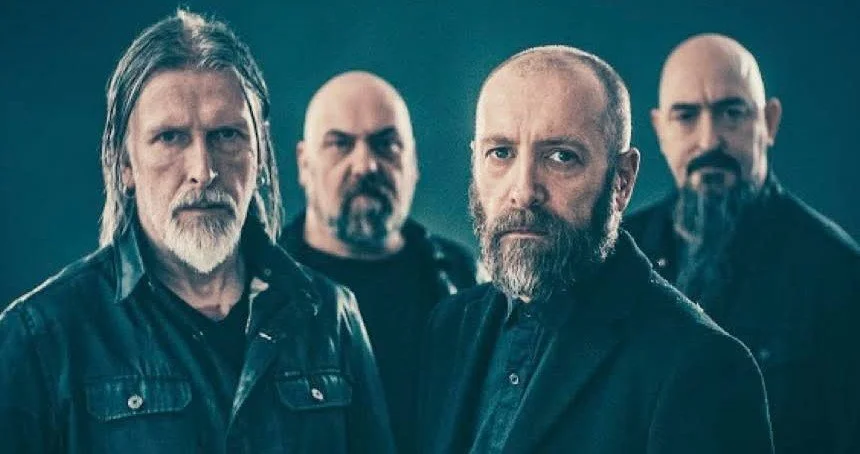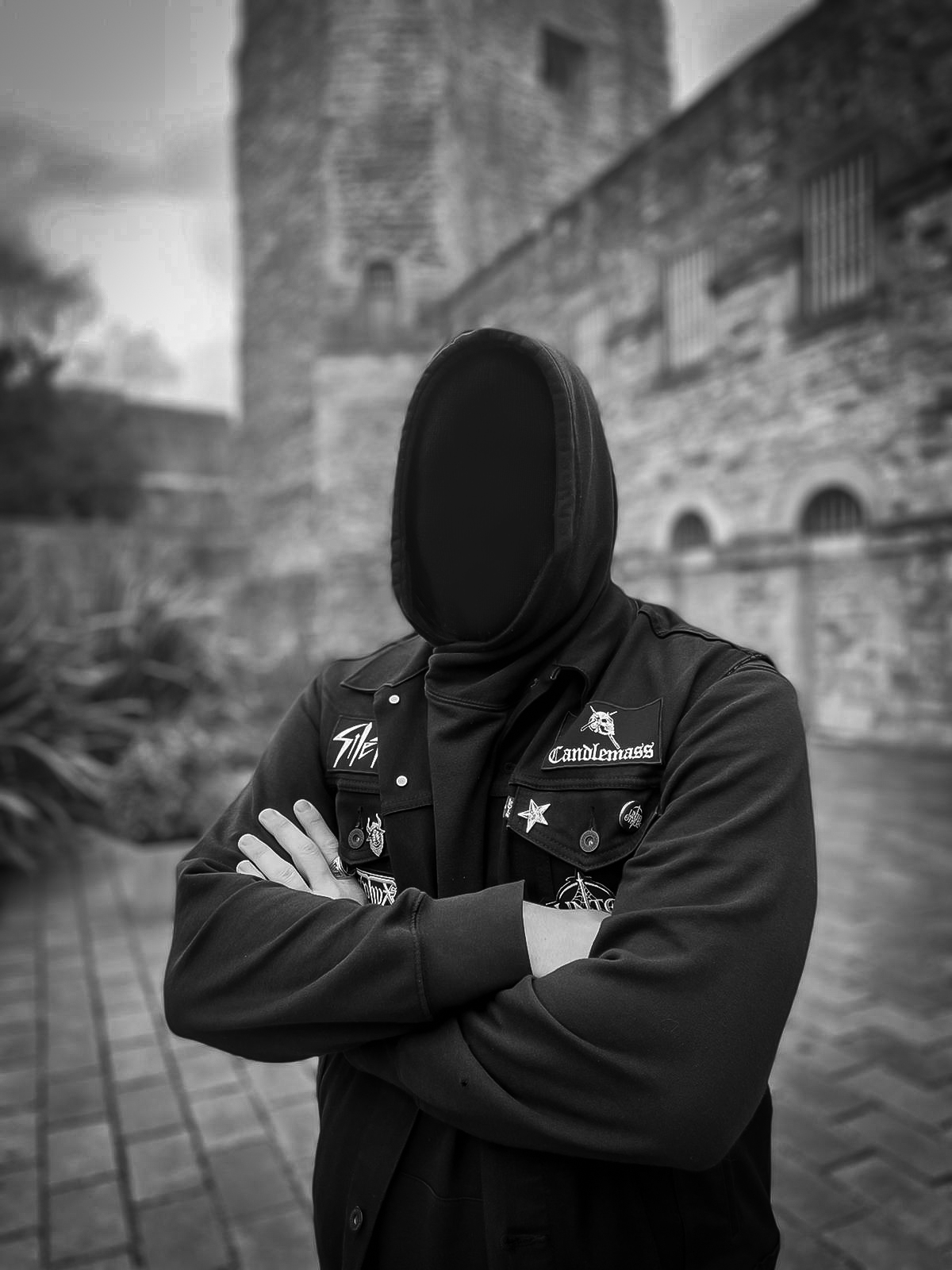Paradise Lost: Ascension – Album Review
Paradise Lost are not supposed to still be here, let alone sounding this potent. Seventeen albums in, most bands either fall into a heritage act or collapse into nostalgia, endlessly replaying the same three records in slightly shinier production.
Ascension refuses that fate. It isn’t a reinvention, because Paradise Lost don’t need reinvention. It is a statement of a band who still know how to make records that feel necessary.
Released through Nuclear Blast and launching next week on September 19th, 2025, Ascension is the longest we’ve had to wait for new Paradise Lost since the late eighties. That wait has been weaponised. Now the band return with something heavier than memory and darker than age.
First Impressions
The artwork does half the talking before the record even spins: George Frederic Watts’ nineteenth-century painting The Court of Death, a Victorian monument to human futility and grandeur in the face of the inevitable.
It’s the most on-the-nose, and therefore the most perfect, cover image Paradise Lost could have chosen for this cycle. If Obsidian was shadows and candlelight, Ascension is the marble slab and the chill in the cathedral air.
Opener Serpent on the Cross doesn’t so much introduce the album as rip the curtain away. The guitars move like siege engines, deliberate and unstoppable, while Holmes roars like he’s personally escorting you down the church steps to damnation. The chorus coils tighter, and the lead guitar slices across the gloom with that Mackintosh melodic sting. It is a reminder that Paradise Lost can still play heavier than bands half their age.
By the time Tyrant’s Serenade arrives, the band are already dealing in contrasts. The verse riff is a bleak hammer pattern, but the chorus spreads evenly…like warm butter! Holmes’ cleans are weary but defiant, carrying the melody without prettifying it. If the first track is execution, the second is aftermath, charred ground made singable.
The Heart of the Album
Salvation is the pivot where Ascension opens up. It runs longer, stretches its limbs, gives Mackintosh space to write one of those mournful, winding leads that feels like a lament from some older century. Holmes alternates between harsh and clean. It’s the sound of pleading and damning yourself in the same breath.
Silence Like the Grave was the first single, and it wears that responsibility well. There’s a lot of immediacy in it, a hook built from despair, a chorus that’s almost too catchy for its own good, yet never loses the sense of rot underneath. When Holmes drops back into gutturals, it feels like a claw from under the floorboards dragging the track down; This is the balance Paradise Lost have perfected.
The midsection is where some critics have claimed the momentum sags. They’re only half right. Lay a Wreath Upon the World slows the pace, yes, but deliberately so. The clean vocal delivery gives it the sense of a hymn, and the riffing is less about propulsion than about ceremony.
Diluvium continues in that mood, its title evoking floods and divine punishment, and its sound matching the theme. The guitars are broad, slow, massive, and the chorus swells like waters rising. For those wanting pure aggression, it can feel like drift. For those listening with patience, it’s immersion, a drowning rather than a fight.
Savage Days picks the pace back up, though “savage” here is less speed and more venom. It’s mid-tempo, stomping, malicious, and the vocal phrasing spits contempt. This track feels engineered for the stage: big enough for festival fields, nasty enough for club pits.
Sirens, Deceivers and The End
Sirens is the jewel of the record’s latter half. The riff is instantly recognisable, rising and falling like waves, and the melody is seductive in the way only doom-laden gothic metal can be: you know it’s leading you to ruin and you follow anyway.
Holmes sings with weary temptation, Mackintosh’s guitar cries above the abyss, and the rhythm section nails down a groove that feels inevitable. If you want a track to show a sceptic why Paradise Lost still matter, this is the one.
Deceivers is leaner, meaner, snapping with bitter energy. It doesn’t overstay, it doesn’t overcomplicate, it just strikes and leaves the bruise. Think of it as the punk cousin lurking in the gothic family.
And then The Precipice closes the album not with catharsis but with confrontation. The riffs grind, the atmosphere suffocates, and Holmes alternates between bark and chant like he’s narrating your final fall. There’s no redemption here. Ascension ends as it began: grim, immense, and uncompromising.
Performance
Paradise Lost in 2025 are a machine with every cog locked into place. Nick Holmes deserves credit for continuing to refine his dual-vocal approach. Where some veterans lose range or power, Holmes has adapted. His gutturals remain sharp, cutting through the mix without sounding forced, and his cleans carry more weathered authority than they did even in the Draconian Times era. He no longer has to “prove” either style; he simply inhabits them.
Gregor Mackintosh is, as always, the band’s architect. His leads define them. The mournful shapes in Salvation, the aching figure in Sirens, the cutting hook in Silence Like the Grave, all are Mackintosh fingerprints, instantly identifiable yet endlessly adaptable. The rhythm work with Aaron Aedy keeps the ground heavy, while Steve Edmondson’s bass finally gets enough room in the mix to matter, thickening the foundations rather than just shadowing.
Behind the kit, Guido Zima is a revelation. Blasts are sparing but effective, the double-kick passages never click-track sterile, and his control of tempo shifts means the doom sections hit like tectonic plates, not slow-motion filler. Lawrence Mackrory’s mix and master give the drums heft without stealing focus from the guitars.
Production and Atmosphere
Produced by Mackintosh himself, Ascension has a clarity that some doom records fear. This is not muddy, swampy despair; it is cold stone despair. The guitars roar but with edges intact, the bass hums like an undertow, the drums hit with body, not just treble. There is headroom in the master, meaning the record breathes at high volume instead of crumbling into compression.
Atmospherically, the album is monastic. Reverb is used with taste, creating cathedrals of space without losing intimacy. Synth textures appear at the margins, like ghost-lights rather than centrepieces. Everything is in service to that sense of ceremony, of ritual, of walking willingly toward the grave because that’s where the songs are leading you.
Theme and Concept
The title Ascension might fool you into thinking this is about transcendence, light, or some form of hopeful release. Don’t be deceived. This is Paradise Lost. The “rising” here is not salvation but struggle, not heavenly flight but the climb against inevitable gravity. The lyrics wrestle with mortality, deceit, persecution, memory, and the futility of seeking purity in a corrupted world.
What makes Paradise Lost compelling is that they never drift into parody. Where lesser bands paint “doom” in cartoon strokes, Holmes and Mackintosh write as if these questions gnaw at them personally. “Silence Like the Grave” is not metaphor; it is a report from the silence. “Lay a Wreath Upon the World” isn’t just imagery; it feels like a lived funeral rite.
Position in the Catalogue
Paradise Lost’s discography is a labyrinth, from the death-doom birthing of Lost Paradise and Gothic, through the melodic heights of Draconian Times, the electronic exile of Host, and the doom-death renaissance since Faith Divides Us – Death Unites Us. In that landscape, Ascension sits as culmination rather than experiment. It draws on the weight of Shades of God, the melody of Icon, the elegance of Obsidian, and welds them into something both familiar and fresh.
Compared to Obsidian, Ascension is colder, grander, more marble and less velvet. Compared to The Plague Within, it is more consistent, less fragmented. Compared to Host, it is practically another universe, though the emotional core is recognisable. For long-time fans, this is as close to a definitive modern statement as they are likely to get. For newcomers, it is an entry point that still carries the weight of history.
The HMC Verdict
Ascension is not the loudest or fastest album of 2025, but it may be the most dignified punch to the soul. Paradise Lost do not reinvent themselves here, but they do not need to. What they deliver is a record that understands doom as more than riffs per minute, gothic as more than eyeliner, and heaviness as more than volume.
It is an album of ceremony, of grief shaped into melody, of riffs that crush because they have lived decades of crushing. It takes patience to unlock its centre, but once it gets under your skin, it refuses to leave.
From where we sit at the Heavy Metal Citadel, Ascension belongs in the year-end conversations not because it shouts the loudest but because it whispers the longest. Five years of silence, and Paradise Lost return with a record that ascends not to heaven, but to the cold throne of masters who still remember how to rule.
Ascension proves Paradise Lost are still writing their future, not just replaying their past.
Written by: Chort the Crop Infestor
“Hi, I’m Chort I infest crops and listen to Black Metal!”





